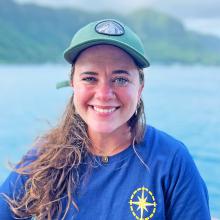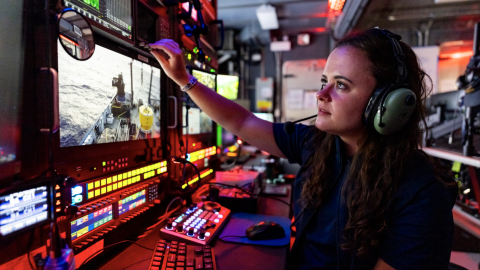
Andrea Vale
Tell us about your work/ research. What kinds of things do you do?
I work as a photographer, videographer, and writer, partnering with scientific institutions to make their work accessible and engaging to all audiences. I specialize in covering marine research, meaning that I spend a few months every year at sea aboard research vessels like the Nautilus. Besides frequently interviewing scientists, no two tasks are often the same when I am working at sea: I've done macro photography from inside of a walk-in freezer, flown drones from the bow, and written dispatches when machines have malfunctioned and operations were at a standstill. As a video engineer, I am able to direct my attention below the surface of the waves, and spend time examining the deep sea floor — the area that I'm most interested in, but am unable to access without the use of ROVs. I am also very interested in ice cores and the polar regions, and sometimes get the chance to combine my love of mountaineering and ice climbing with exploring the climate in extreme environments.
What sparked your initial interest in your career?
I have always been awed by the natural world and deep sea, but knew from a young age that my interests and skills lay in writing and creative work. In contrast, I thought of the ocean as the domain of scientists — not writers and artists. After studying English literature and Creative Writing in undergrad, I was fortunate enough to get hired onto the National Geographic Society’s Science and Exploration team. I found myself surrounded by not just researchers but also filmmakers, musicians, painters, and others who helped me realize that storytelling — ”science-telling” — is as central to science as data and research. A few years later, I served as the videographer aboard the Henry B. Bigelow, documenting the Woods Hole Oceanographic Institution’s research into the Ocean Twilight Zone. For two weeks, I viewed the ocean through a lens, allowing me to search for the smallest details in the world’s most vast canvas, the sea. But as much as I loved holding a magnifying glass to the ocean, my ability to do so was limited. I couldn’t capture what we were all there to explore: under the surface itself. Since then, I have pivoted towards video engineering, to be able to focus my work on the deep sea floor.
Who influenced you or encouraged you the most?
I have had a few very transformational mentors — some who also work for the OET — who have shown me that this unusual and fascinating career path is in fact possible, and not just a pipe dream. It's no coincidence that all of them have also been women like myself, and they have encouraged me to speak up, advocate for myself, and keep knocking on doors, even when it feels like no one is answering.
What element of your work/ study do you think is the most fascinating?
The bottom of the ocean may seem like a world furthest and most disconnected from human civilization, but it is actually intertwined with our everyday lives. The more we discover about the sea floor, the more we can connect these discoveries to our lives on shore, and how our societies engage with and manage our coasts and oceans.
I am particularly fascinated by the deep seabed, and the challenge it presents of finding ways to encourage the general public to be aware of and invested in the deepest, most distant parts of the ocean floor. Areas like the Clarion-Clipperton Fracture Zone are home to many species that are found nowhere else in the world; test mining sites are popping up across the seabed’s topography as opportunists from across the world race to claim its mineral resources while they are still unregulated by international law. In the coming years, proposals for no-mining Marine Protected Areas will cause us to grapple with an exceedingly complicated question: who owns the deep sea?
Studying and understanding the deep seabed holds important implications for politics, culture, economics, and much more.
How did you get involved with Ocean Exploration Trust? How did you become part of the expedition team?
I first learned about the Ocean Exploration Trust's work while working on the National Geographic Society's Science and Exploration team. Soon after, I studied for an interdisciplinary MSc in Biodiversity, Conservation and Management at Oxford, and began working in the science communication world. With those experiences under my belt, I applied for the Video Engineering position.
What other jobs led you to your current career?
I've been lucky enough to tackle many different jobs in remote regions, and I think that even ones that aren't directly STEM-related have helped me get to where I am today. I've written magazine articles, poems, and short stories for magazines that explore the natural world; I've been a producer on a National Geographic show in rural Argentina; I've been an assistant to another Nat Geo journalist reporting from the field in India; I've filmed baboons in South Africa; I've interviewed vintners here in California. I think that all of the experiences I've had combine to give me a unique perspective on ocean science that is broad and holistic, and informed by culture, policy, community, and history in addition to strictly science.
What are your degrees and certifications?
Masters of Science in Biodiversity, Conservation, and Management — University of Oxford 2021
Bachelor of Art in English literature, Creative Writing, and Journalism — University of Notre Dame 2018
PADI Open Water Diver
Wilderness and Remote Location First Aid
What are your hobbies?
I am an avid mountaineer, rock climber, and ice climber, and spend much of my time onshore exploring the Sierra Nevada in California. I also collect hot sauces, and love hosting tastings (or challenges, depending on the participant's perspective!)
What advice would you give someone who wants to have a career like yours?
Embrace discomfort. The experiences that have intimidated me the most are also the ones I've grown the most from, both professionally and personally. I believe that discomfort enables the risks, inquisitiveness, and quick-thinking necessary for boundary-pushing exploration and innovation. I deeply value the camaraderie I’ve felt with crew members, climbing partners, and colleagues while working in close confines and tough situations in remote areas across the globe. Tackling surprises and solving problems — whether at sea or in the mountains — can expand your understanding of science and creativity, and show yourself what you're really capable of.
What excites me most is being able to take our discoveries from the deep sea back onshore, and connect them to communities on land.
Expeditions
Andrea participated in the following Ocean Exploration Trust expeditions:

